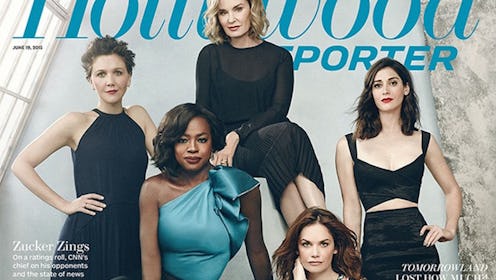Entertainment
'THR's Drama Actress Roundtable Got Real

The Hollywood Reporter is back with another excellent version of their roundtables that bring powerful, talented women in Hollywood together to talk about the industry and beyond. Released about 2 weeks after their similar roundtable for Emmy-contending comedians, the Hollywood Reporter brought together the Emmy-contending drama actresses Jessica Lange, Viola Davis, Taraji P. Henson, Lizzy Caplan, Maggie Gyllenhaal, and Ruth Wilson to discuss everything from sex, age, race, and what they would be doing if they weren't in Hollywood.
All of the actresses spoke candidly about their struggles to succeed and make a name for themselves as women in Hollywood: Viola Davis from How To Get Away With Murder and Taraji P. Henson from Empire, in particular, said some important things about the adversity they face as older, African-American actresses in a landscape that often doesn't make space for them. As the interviewer mentions in the piece, "'diversity' was the buzzword of the broadcast season" this year — especially after the 2015 Academy Awards ceremony was the whitest in 17 years.
All of the actresses speak eloquently and thoughtfully about the subject — as well as female roles in the industry — and their words should absolutely prompt some serious thought about the state of diversity in Hollywood.
Here are six of the most significant, thought-provoking quotes from the roundtable that everyone NEEDS to pay attention to.
Davis, On Totally Owning Her Character
When I saw myself for the first time in the pilot episode [of How To Get Away With Murder], I was mortified. I saw the fake eyelashes and, "Are you kidding me? Who is going to believe this?" And then I thought: "OK, this is your moment to not typecast yourself, to play a woman who is sexualized and do your investigative work to find out who this woman is and put a real woman on TV who's smack-dab in the midst of this pop fiction.
Wilson, On Playing In Sex Scenes
I had only done one sex scene before The Affair. Dominic [West] and I are really insistent that those scenes in the show have a narrative. It can't just be a normal generic sex scene. "What are we saying here?" There are assumptions that women are always the focus of titillation. And I wanted my contract to say: "For every female orgasm, there had to be a male orgasm."
You actually requested that?
I didn't, but I'm thinking about it. (Laughter.)
Lange, On What Her Dream Role Would Be
How about revisiting something? I'm going to do a production next year where I play Mary Tyrone again from Long Day's Journey Into Night. It's been 15 years. I did a production before in London. To play it and then to step back and it to come back, the work becomes like something else. I don't know how to explain it. It's in your marrow, your muscle memory, but it finds a new expression. It's thrilling.
Henson, On Insecurity About Roles
I got nervous and started pacing the floor. "Oh my God, Cookie is bigger than life. You will love her or hate her." Empire has forced people to have conversations that they were afraid to have. And that is what art is supposed to do. I just didn't know it was going to shake things up this much!"
Gyllenhaal, On Bringing Realism To Sex Scenes
I was interested in it then, too. (Laughs.) But I was never the actress asked to be the hot girl who took her clothes off on her first day of work. I was never objectified that way. But in The Honorable Woman, my character Nessa is so controlled, I wanted the sex to be animal. Unfortunately, it was the BBC and so it couldn't be totally animal. (Laughs.) Also, I wanted to show what a woman my age actually really looks like. I am much more turned on when I see people's bodies that look like bodies I recognize.
Caplan, On Playing Female Anti-Heroes
But it's nice to play someone who is not likable, someone who does dubious things. That's the thing in cable — they let us do more. I've done network TV, and it's all about people constantly trying to figure out ways to make you relatable, which adds a layer of exhaustion to it.
Check out the full roundtable interview over at THR, here.
Images: The Hollywood Reporter; Getty Images (6)